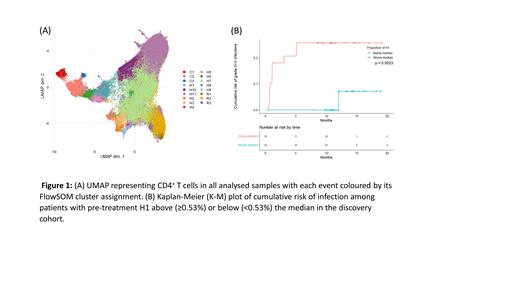Introduction: In chronic lymphocytic leukaemia (CLL), a dynamic interplay exists whereby CLL cells shape the immune microenvironment and perturb normal immune function while at the same time relying on non-malignant immune cells for survival and proliferation signals. However, it is unclear to what extent different T-cell populations vary among individual CLL patients and whether such variation influences the occurrence of specific clinical events. To address this knowledge gap, pre-treatment blood samples obtained from patients enrolled in a large clinical trial of frontline therapy were subjected to deep immune phenotyping by mass cytometry and the results related with clinical outcomes.
Methods: The discovery cohort comprised pre-treatment samples from 79 CLL patients enrolled in the NCRI RIAltO trial (NCT01678430) who underwent factorial randomisation to ofatumumab and either bendamustine or chlorambucil, with or without idelalisib. The validation cohort included a randomly selected group of 59 patients who received bendamustine and ofatumumab only. Thirty pre-treatment samples from the discovery cohort were further selected for ex vivo T-cell stimulation using CD3/CD28 microbeads. All samples were analysed using mass cytometry and customised antibody panels.
Results: FlowSOM clustering was applied to all CD3 + T cells in the discovery cohort. Generated clusters were merged and annotated based on their median marker expression. 17 distinct CD4 + clusters were identified and categorised as cytotoxic cells (C1-3), helper cells (Th; H1-11), and regulatory cells (R1-3), whereas 23 CD8 + clusters were identified and categorised as NK T-cells (NKT1-4) and cytotoxic T-cells (T1-19). Cox proportional hazard regression analysis considering baseline characteristics and treatment allocation revealed associations between pre-treatment cluster frequencies and clinical endpoints. Cluster H1 correlated with a lower risk of grade ≥3 infections (HR 0.007 [95% CI: 0.001 - 0.782], P = 0.039), cluster T10 with a lower risk of grade ≥3 second primary malignancy (SPM; HR 0.811 [95% CI: 0.660 - 0.997], P = 0.047), and cluster T12 with longer overall survival (OS; HR 0.844 [95% CI: 0.719 - 0.990], P = 0.037). Based on the expression of non-redundant markers, corresponding T-cell subpopulations with distinct immune signatures were prospectively defined which closely resembled the three clinically significant clusters and were associated with the same clinical endpoints (ICOS +HLA-DR +PD1 +TIGIT +Tbet +CD4 + helper (Th) cells and H1; CD27 +CD28 -PD1 +Tbet +Eomes +CD8 + cells and T10; CD27 +CD28 -GrymB +Tbet +Eomes +CD8 + terminal effector (TE) cells and T12). Using the same gating strategies and cut-off values, the association between ICOS +HLA-DR +PD1 +TIGIT +Tbet +CD4 + Th cells and infections, as well as CD27 +CD28 -GrymB +Tbet + Eomes +CD8 + TE cells and OS were confirmed in the validation cohort (it was not possible to confirm the association between CD27 +CD28 -GrymB +Tbet +Eomes +CD8 + TE cells and SPM due to a paucity of events in the validation cohort). Following stimulation by CD3/CD28 microbeads, enrichment of primed and polyfunctional cells was observed in all clinically significant T-cell subpopulations compared to their parent CD4 + or CD8 + T cells.
Conclusion: The present study has identified three previously undescribed T-cell subpopulations that appear to influence the risk of infection, SPM, and death in patients with CLL receiving frontline chemo-immunotherapy. Further studies are warranted to validate these findings in the setting of targeted agents and in patients receiving CIT for other haematological malignancies.
Disclosures
Duckworth:Pharmaron Biologics: Current Employment. Kalakonda:Gilead/Kite: Other: Advisory boards, speaker fees and travel grants, Research Funding; Incyte: Other: Advisory boards, speaker fees and travel grants; Hospira: Other: Advisory boards, speaker fees and travel grants; Abbvie: Other: Advisory boards, speaker fees and travel grants; BMS/Celgene: Other: Advisory boards, speaker fees and travel grants, Research Funding; Janssen: Other: Advisory boards, speaker fees and travel grants; Karyopharm: Other: Advisory boards, speaker fees and travel grants; Roche: Other: Advisory boards, speaker fees and travel grants, Research Funding; Takeda: Other: Advisory boards, speaker fees and travel grants. Pettitt:Roche: Research Funding; Napp: Research Funding; Chugai: Research Funding; Gilead: Research Funding; GSK/Novartis: Research Funding; Celgene: Research Funding.


This feature is available to Subscribers Only
Sign In or Create an Account Close Modal